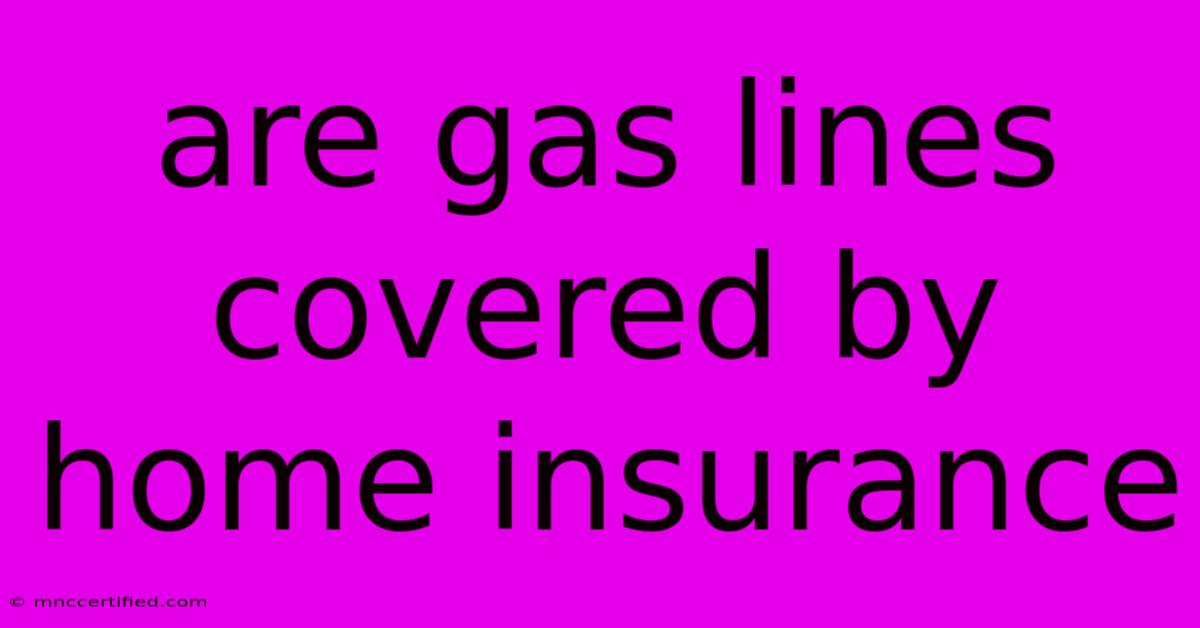Are Gas Lines Covered By Home Insurance

Table of Contents
Are Gas Lines Covered by Home Insurance? A Comprehensive Guide
Owning a home comes with a lot of responsibilities, and ensuring your property is adequately insured is one of the most important. Gas lines are a vital part of your home, providing heating, cooking, and sometimes even hot water. But are these essential components covered under your home insurance policy? The answer, unfortunately, is not a straightforward yes or no.
Understanding Coverage
Whether your gas lines are covered by your home insurance depends on a few key factors:
- The type of damage: Is the damage caused by a covered peril like a fire, explosion, or natural disaster? Or is it due to neglect, poor maintenance, or a pre-existing condition?
- Your specific policy: Every insurance company has its own set of terms and conditions. Read your policy carefully to understand the coverage details.
- The location of the damage: Is the damage to the gas lines within the home or outside? Some policies may cover damage to the lines on your property, while others may not.
Common Exclusions
While some insurance policies may cover damage to gas lines under specific circumstances, here are some common exclusions you should be aware of:
- Pre-existing conditions: If the damage is due to a known problem with your gas lines, like corrosion or old age, it may not be covered.
- Neglect or poor maintenance: If the damage is caused by your failure to maintain your gas lines properly, it may not be covered.
- Normal wear and tear: Insurance policies typically do not cover the cost of repairs for normal wear and tear on your gas lines.
- Underground lines: Many policies exclude coverage for damage to underground gas lines, as these are typically more difficult to inspect and maintain.
How to Ensure Adequate Coverage
To ensure that your gas lines are adequately covered, consider the following:
- Review your policy: Understand the specific terms and conditions regarding gas line coverage.
- Consider additional coverage: Talk to your insurance agent about adding additional coverage for gas lines, especially if your home has older plumbing or is located in an area prone to natural disasters.
- Maintain your gas lines: Regular maintenance can help prevent problems and potentially reduce your risk of damage.
The Importance of Gas Line Maintenance
Maintaining your gas lines is essential for safety and to avoid costly repairs. Here are some simple things you can do:
- Schedule regular inspections: Professional inspections can identify potential problems early, before they lead to serious damage.
- Check for leaks: Look for signs of leaks, such as the smell of gas, hissing sounds, or dead vegetation around your gas lines.
- Don't tamper with your gas lines: Only qualified professionals should handle gas line repairs or installations.
Conclusion
While some home insurance policies may offer coverage for gas lines, it's crucial to understand the specific terms and conditions of your policy. By proactively reviewing your coverage and maintaining your gas lines, you can protect your home and your family from potential risks and costly repairs.

Thank you for visiting our website wich cover about Are Gas Lines Covered By Home Insurance. We hope the information provided has been useful to you. Feel free to contact us if you have any questions or need further assistance. See you next time and dont miss to bookmark.
Featured Posts
-
Does Homeowners Insurance Cover Repiping
Nov 08, 2024
-
Inverse Finance Crypto Price Prediction
Nov 08, 2024
-
Play Station 5 Pro Out Now Get Started
Nov 08, 2024
-
Public And Products Liability Insurance
Nov 08, 2024
-
Australia Vs Pakistan Pakistan Triumphs By 9 Wickets
Nov 08, 2024